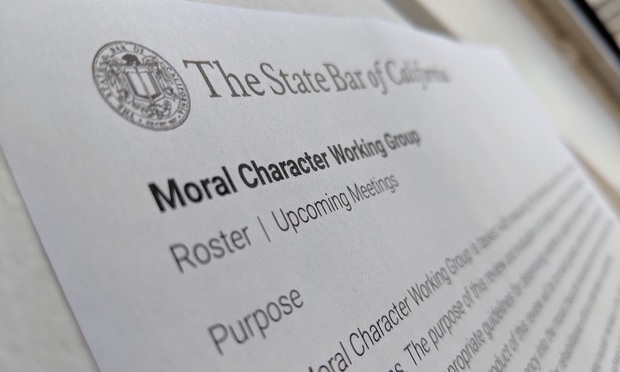Two California Efforts Could Revamp Attorney 'Moral Character' Review
Both efforts promise to reshape a secrecy-shrouded system that can be a mystery to applicants as well as the public it's designed to protect.
June 20, 2019 at 07:46 PM
5 minute read
 A state bar working group is charged with reviewing and possibly revamping how the bar gauges applicants' moral fitness.
A state bar working group is charged with reviewing and possibly revamping how the bar gauges applicants' moral fitness.
California is embarking on two paths toward changing how it evaluates would-be lawyers' moral character, with one route starting in the state bar and the other going through the Legislature.
A state bar working group charged with reviewing and possibly revamping how the bar gauges applicants' moral fitness met for the first time June 7 in San Francisco. A bill moving separately in the state Legislature would largely prohibit the bar from seeking future lawyers' mental health records during the character assessment process.
Both efforts promise to reshape a secrecy-shrouded system that can be a mystery to applicants as well as the public it's designed to protect.
“We don't really know what to tell students is going to happen” in the process, Humphreys University Drivon School of Law Dean Patrick Piggott, a member of the bar's moral character working group, said at the panel's first meeting.
A law school student can submit a character evaluation application and “two years later, 'Oh, I had a misdemeanor marijuana conviction 12 years ago and now they're asking for 10 years of income tax returns,'” Piggott said. “I don't know what to tell students. At least the people who have to go through the process need to be better informed.”
The working group was created, in part, as a response to a 2018 review of bar committees. The report found that statements about moral character reviews from members of the Committee of Bar Examiners “indicate problems of subjectivity and bias; unfounded belief in their power to assess candor and remorse; and the use of ad hoc criteria as indicators of successful rehabilitation.”
State bar applicants are asked extensive questions about any criminal convictions, substance abuse, debt and “violation of schools' honor codes.” They must also provide references from current and past employers as well as a set of fingerprints. A bar spokeswoman said 35 applicants to the bar received adverse moral character determinations in 2018. The bar admitted 5,025 attorneys that year.
Edward Lear of the Century Law Group, who has represented attorneys in admissions matters, said the majority of applicants sail through the moral character review with no problems. A remaining small pool of bar candidates—those with an older, nonviolent conviction or a past substance abuse problem—can draw more scrutiny, he said. Those applicants are asked to appear at an informal conference with a subcommittee of bar examiners to address reviewers' concerns.
“It's all about rehabilitation and insight into the wrongdoing,” Lear said.
Applicants who receive a negative finding of moral character can petition the state bar court to review the determination. That decision can then be appealed to the California Supreme Court.
Bar examiners use state law, bar rules and case law in determining whether a would-be lawyer possesses the appropriate candor and integrity. The process is outlined in a moral conduct statement on the bar's website, but it's not always a good predictor of how the bar might handle a particular issue.
“What we have is a moral conduct statement,” Mark Torres-Gil, assistant general counsel at the state bar, told the working group at its June 7 meeting. “But we don't have anything that says these are our standards and guidelines in an articulated and clear basis.”
The group's final product, Torres-Gil said, should provide “greater uniformity and consistency in decision-making, transparency and rehabilitation standards.” The final report will be presented to the state bar's board of trustees.
Lawmaker confronts 'stigma of mental health'
In the California Legislature, Sen. Tom Umberg, D-Santa Ana, a member of the bar since 1980, is pushing a bill to keep the state bar out of applicants' mental health records.
As part of the moral character review process, the bar requires applicants to sign a release form giving examiners access to their medical and mental health records, according to an analysis of the issue by the Assembly Judiciary Committee. A bar spokeswoman said examiners only request mental health records when “underlying misconduct” raises moral character questions. Bar admissions managers must approve such requests, she said.
How often the bar delves into those records is unclear, but Umberg said he knows of candidates who fear what they might have to divulge about seeking professional help. SB 544 would stop the bar from asking for access to those records in most cases.
“The purpose of the bill is to reduce the stigma of mental health issues and to help mitigate any chilling effect that many prevent law students from getting treatment for mental health issues, including sexual assault and PTSD,” Umberg said Monday.
Other states—including Virginia, Washington and Louisiana—have already acted to block the access that state bar officials have to mental health records. The Conference of Chief Justices in February urged all states to remove mental health inquiries from its bar applications.
The California bar board of trustees has not taken a position on SB 544. Umberg said the bill, which has already passed the Senate, could come up for a vote on the Assembly floor next week.
Read more:
Law Firms Tackle Mental Health, One Initiative at a Time
Is the Legal Industry Ready for a Culture Shift on Mental Health?
Seeing Lawyers in Crisis, Some Blame the Billable Hour
Confronting the Mental Health Crisis in the Legal Profession
This content has been archived. It is available through our partners, LexisNexis® and Bloomberg Law.
To view this content, please continue to their sites.
Not a Lexis Subscriber?
Subscribe Now
Not a Bloomberg Law Subscriber?
Subscribe Now
NOT FOR REPRINT
© 2025 ALM Global, LLC, All Rights Reserved. Request academic re-use from www.copyright.com. All other uses, submit a request to [email protected]. For more information visit Asset & Logo Licensing.
You Might Like
View All
Coalition of AGs Support Updates to ABA's Legal Education Diversity Standard
3 minute read
California Supreme Court Rejects State Bar's Initial Plan for New Bar Exam
4 minute read
Governor Signs Legislation Raising Lawyers' Licensing Fees by $88 in 2025
3 minute read
California Bar Wants to Offer Exam Score Boosts, Payments to Sample Test Guinea Pigs
4 minute readTrending Stories
- 1Uber Files RICO Suit Against Plaintiff-Side Firms Alleging Fraudulent Injury Claims
- 2The Law Firm Disrupted: Scrutinizing the Elephant More Than the Mouse
- 3Inherent Diminished Value Damages Unavailable to 3rd-Party Claimants, Court Says
- 4Pa. Defense Firm Sued by Client Over Ex-Eagles Player's $43.5M Med Mal Win
- 5Losses Mount at Morris Manning, but Departing Ex-Chair Stays Bullish About His Old Firm's Future
Who Got The Work
J. Brugh Lower of Gibbons has entered an appearance for industrial equipment supplier Devco Corporation in a pending trademark infringement lawsuit. The suit, accusing the defendant of selling knock-off Graco products, was filed Dec. 18 in New Jersey District Court by Rivkin Radler on behalf of Graco Inc. and Graco Minnesota. The case, assigned to U.S. District Judge Zahid N. Quraishi, is 3:24-cv-11294, Graco Inc. et al v. Devco Corporation.
Who Got The Work
Rebecca Maller-Stein and Kent A. Yalowitz of Arnold & Porter Kaye Scholer have entered their appearances for Hanaco Venture Capital and its executives, Lior Prosor and David Frankel, in a pending securities lawsuit. The action, filed on Dec. 24 in New York Southern District Court by Zell, Aron & Co. on behalf of Goldeneye Advisors, accuses the defendants of negligently and fraudulently managing the plaintiff's $1 million investment. The case, assigned to U.S. District Judge Vernon S. Broderick, is 1:24-cv-09918, Goldeneye Advisors, LLC v. Hanaco Venture Capital, Ltd. et al.
Who Got The Work
Attorneys from A&O Shearman has stepped in as defense counsel for Toronto-Dominion Bank and other defendants in a pending securities class action. The suit, filed Dec. 11 in New York Southern District Court by Bleichmar Fonti & Auld, accuses the defendants of concealing the bank's 'pervasive' deficiencies in regards to its compliance with the Bank Secrecy Act and the quality of its anti-money laundering controls. The case, assigned to U.S. District Judge Arun Subramanian, is 1:24-cv-09445, Gonzalez v. The Toronto-Dominion Bank et al.
Who Got The Work
Crown Castle International, a Pennsylvania company providing shared communications infrastructure, has turned to Luke D. Wolf of Gordon Rees Scully Mansukhani to fend off a pending breach-of-contract lawsuit. The court action, filed Nov. 25 in Michigan Eastern District Court by Hooper Hathaway PC on behalf of The Town Residences LLC, accuses Crown Castle of failing to transfer approximately $30,000 in utility payments from T-Mobile in breach of a roof-top lease and assignment agreement. The case, assigned to U.S. District Judge Susan K. Declercq, is 2:24-cv-13131, The Town Residences LLC v. T-Mobile US, Inc. et al.
Who Got The Work
Wilfred P. Coronato and Daniel M. Schwartz of McCarter & English have stepped in as defense counsel to Electrolux Home Products Inc. in a pending product liability lawsuit. The court action, filed Nov. 26 in New York Eastern District Court by Poulos Lopiccolo PC and Nagel Rice LLP on behalf of David Stern, alleges that the defendant's refrigerators’ drawers and shelving repeatedly break and fall apart within months after purchase. The case, assigned to U.S. District Judge Joan M. Azrack, is 2:24-cv-08204, Stern v. Electrolux Home Products, Inc.
Featured Firms
Law Offices of Gary Martin Hays & Associates, P.C.
(470) 294-1674
Law Offices of Mark E. Salomone
(857) 444-6468
Smith & Hassler
(713) 739-1250






